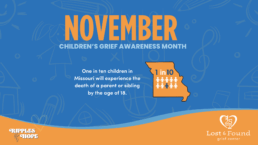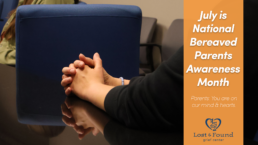Lost & Found Grief Center recognizes Children's Grief Awareness Month in November by sending out "Ripples of Hope"
This November, in recognition of Children's Grief Awareness Month, Lost & Found Grief Center is raising awareness about the needs of grieving children and spreading ripples of hope through kindness and thoughtful support.
According to the JAG Institute's 2025 Childhood Bereavement Estimation Model, 1 in 11 children—about 6.4 million nationwide—will lose a parent or sibling before the age of 18. In Missouri, the rate is higher: 1 in 10. These sobering statistics underscore the urgent need to recognize and respond to children's grief.
"Like a stone cast into water that creates a ripple; we witness ripples of hope at Lost & Found weekly as kids (and parents) realize they are not alone in their grief," said Mark Miller, executive director of Lost & Found Grief Center. "Children mourning the death of a parent meet other kids experiencing similar losses and build community. After 25 years of serving grieving families, we are now seeing once-grieving children and parents return to Lost & Found to volunteer, serve on our boards, or join our staff. The positive impact of grief support is exponential."
Adults can send a ripple of hope to grieving children in their lives by:
- Actively listening.
- Using clear, concrete, age-appropriate language.
- Validating their feelings.
- Being honest and telling the truth in appropriate ways.
- Consistently showing up for them.
- Providing them with opportunities to express their grief.
- Modeling healthy grieving.
Throughout November, Lost & Found will share stories of the children and families who have benefited from their professional therapeutic grief support services. All Lost & Found grief groups are no cost to the families they serve, but the impact on those who experience grief support is priceless. After receiving grief services at Lost & Found:
- 81% of children knew how to express "big grief feelings."
- 86% of teens found a way to carry their grief and move forward in life.
- 94% of parents were better equipped to navigate their grief.
On Thursdays throughout November, Lost & Found invites the public to wear blue to shine a light on the brave children and families in the community who are learning to heal after loss. Together, Lost & Found and its supporters can show grieving children and parents that they are seen, supported, and never alone.
For a full rundown of ways to commemorate Children's Grief Awareness Month, visit our Children's Grief Awareness page.
For more information on Children's Grief Awareness Month, view this report on Childhood bereavement.
###
Contact: Mark Miller, Lost and Found Grief Center executive director, (417) 839-2886, mmiller@lostandfoundozarks.com
About Lost & Found Grief Center: Founded in 2000, Lost & Found Grief Center strives to improve lives in the community by providing help, hope, and healing through professional grief support services. The Lost & Found Grief Center works with those who are suffering to provide education and support as they face life without their deceased loved one.
Back-to-School Tips to Help Grieving Children
Back-to-School Trips to Help Grieving Children
The start of a new school year is a time for families to return to routines. After a summer of fun, camps, and a more relaxed pace, students and parents often look forward to the predictable cadence of school.
However, for children who experienced the loss of a parent, caregiver, or sibling the previous year, the start of school brings uncertainty and sadness as they navigate this annual milestone without an important person in their lives.
“It’s essential for teachers, administrators, fellow students, and their parents to understand how hard it is for a child following the loss of a loved one, ” said Melanie Blair, assistant executive director of Lost & Found Grief Center. “Communication is the key. We need to acknowledge the child’s loss and hold space for them during this difficult transition.”
Lost & Found Grief Center offers these tips for parents, caregivers, and teachers to help make that first semester back to school after a significant loss as smooth as possible.
Tips for parents and caregivers:
- Notify your child’s teachers. You want your child’s teacher to be aware of the death. Discuss with your child what they are comfortable sharing, so they feel included in the process. If the death occurred over the summer or a child is going to a new school, they may want to keep the death a secret. Parents should talk to their child about telling their story rather than having it come out in whispers.
- Speak with your child’s school counselor. After a death, children may exhibit changes in behavior: anger, trouble concentrating, isolation, and slipping grades. These changes can be part of normal grief and adjustment, but if they persist, they can be a sign that professional support is needed.
- Make a communication plan. You, your child’s teacher, and your child’s school counselor must communicate in a way that will work for all parties. If you have concerns at home, do not hesitate to update your child’s teacher and counselor so they can be aware and request that they do the same with you.
- Parents should take care of themselves. While self-care may be difficult following a tragic loss, research has shown that how grieving children fare is correlated to how their adult caregivers are doing.
Tips for teachers and counselors:
Teachers should know that even the most seemingly innocent activity can be overwhelming for a grieving student. Something as simple as an essay prompt that asks, “What did you do over the summer?” could inadvertently force a child to re-live the death of a family member.
- Be aware of potential grief prompts and provide additional support and understanding.
- Let students know their response is normal.
- Provide extra individual attention and support.
- Provide alternative assignments.
- Allow extra time for adjustment to new routines.
- Let the student know you understand things are different and challenging for them and invite them to talk to you about their struggles.
- Check in with these students more frequently to show support and encourage them to share their feelings.
- Establish a communication plan with parents and caregivers.
For more information about helping a student return to school following the death of a loved one, please contact Lost & Found Grief Center at (417) 865-9998.
Tips for Bereaved Parents Month in July
Every year in the United States, approximately 37,000 children die before reaching their eighteenth birthday. Deceased children of any age and their grieving parents are the focus of Bereaved Parents Month in July. Bereaved Parents Month aims to raise awareness about the grief parents experience following the death of a child.
“Parents are not supposed to outlive their children. It is not the natural cycle of life,” said Melanie Blair, assistant executive director at Lost & Found Grief Center. Blair is a bereaved mother herself, having lost her son Charlie to complications from bacterial meningitis in 2018.
“While the death of a child is devastating, at Lost & Found, we tell people, ‘The worst grief is your grief,’” Blair said. “So, whether you are grieving the loss of a young child, an adult child, a spouse, or a sibling, the steps to take care of yourself or what you can do to help someone you care about are similar.”
How to take care of yourself when you are grieving the loss of a child:
- Sleep, drink water, eat nutritious food, and exercise. You cannot feel better if your body does not feel good.
- Understand that grief is a natural response to the death of a loved one. While losing a child is not normal, grief is a natural reaction to the death of a child.
- Do not put a time limit on your grief. Grief lasts as long as it lasts.
- Seek professional help. Grief can be incredibly lonely and isolating—attending therapeutic grief groups or individual counseling like that offered at Lost & Found Grief Center can help ease the feelings of isolation.
How to support someone who has experienced the death of a child.
- Don’t just offer to help – find a way to help. Mow the lawn, care for pets, make a grocery run, or clean their house. You cannot take away their pain, but you can ease some of the burdens of everyday life.
- Avoid “at least” sayings, such as “At least they aren’t suffering anymore” or “At least they died peacefully.” Their child is dead, and the well-meaning attempts to make the parent feel better may only end up making them feel worse.
- Say their child’s name. A parent may fear that their deceased child will be forgotten, so speak their child’s name.
- Hold space for the grieving parent. You don’t have to say anything, but a caring presence can help ease someone’s grief.
- Do something to honor their child’s memory. A donation or act of kindness in their child's name will mean a great deal to a grieving parent.
It is also a good idea to encourage friends or family members who have lost a child of any age to seek professional grief support. Lost & Found Grief Center offers therapeutic grief support groups at no cost to the families it serves.
For more information on Lost & Found’s therapeutic grief support, visit lostandfoundozarks.com or call (417) 865-9998.
###
Contact: Mark Miller, Lost & Found Grief Center, Executive Director, (417) 839-2886, mmiller@lostandfoundozarks.com



